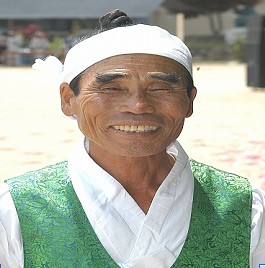금과들소리
| 금과들소리 Geumgwa Deulsori (Farmers’ Songs of Geumgwa) |
|
 금과들소리(들소리)(이정호), 국가문화유산포털, 문화재청. |
|
| 대표명칭 | 금과들소리 |
|---|---|
| 영문명칭 | Geumgwa Deulsori (Farmers’ Songs of Geumgwa) |
| 한자 | 金果들소리 |
| 지정(등록) 종목 | 전라북도 무형문화재 제32호 |
| 지정(등록)일 | 2005년 3월 11일 |
| 분류 | 무형문화재 |
| 시대 | 조선시대 |
| 웹사이트 | 금과들소리(들소리)(이정호), 국가문화유산포털, 문화재청. |
해설문
국문
금과들소리는 15∼16세기 무렵부터 순창군 금과면 매우리 일대에서 논농사를 지으며 부르는 노동요이다. 동전 들녘과 대장 들녘 등에서 불렸으며, 농사짓는 고된 노동의 시름을 흥겨움으로 전환하고, 풍년을 기원하는 농민들의 긍정적이고 소박한 생활상이 담겨 있다.
금과들소리에는 1년의 논농사 과정이 들어 있다. 「물푸기 소리」, 「모찌는 소리」, 「모심기 소리」, 「김매기 소리」, 「장원질 소리」 등으로 이루어져 있으며, 선후창, 교환창, 제창 등 다양한 가창 방식을 섞어 부른다.
20세기 중반 농업기술이 기계화됨에 따라 공동으로 일하는 경우가 줄어들면서, 금과들소리 역시 점차 불리지 않게 되었다. 이를 안타깝게 여긴 지역 주민들이 1997년에 사라져 가는 농요를 채록 발굴하였으며, 현재 순창농요금과들소리보존회에서 계승 · 보존하는 데 힘쓰고 있다.
2005년에 전라북도 무형문화재로 지정되었고, 2007년에는 이정호(1940∼2017)가 예능 보유자로 인정되었으며, 매년 모내기 시기인 6월 둘째주 일요일에 정기 현장공연이 열리고 있다.
영문
Geumgwa deulsori (Farmers' Songs of Geumgwa)
Farmers’ songs (deulsori) are call-and-response style songs sung in rhythm to the farming motions in order to improve efficiency, to withstand the exhaustion of laborious farming work, and to wish for an abundant harvest.
The farmers’ songs of Geumgwa (Geumgwa deulsori) have been passed down by farmers working in the Dongjeon and Daejang Rice Fields near Maeu-ri Village in Geumgwa-myeon Township since the 15th-16th centuries. There are several songs, each for a different step in the farming process, such as water draining, picking rice seedlings, transplanting rice seedlings, weeding, and choosing the most successful farmer.
Due to the mechanization of agricultural technology in the mid-20th century, collective labor decreased, and the farmers’ songs gradually ceased to be sung. However, finding this unfortunate, local residents began searching for records of the songs beginning in 1997. Today, the Geumgwa Farmers’ Songs Preservation Society seeks to transmit and preserve the original form of the Farmers’ Songs of Geumgwa.
In 2005, the Farmers’ Songs of Geumgwa were designated as a Jeollabuk-do Intangible Cultural Heritage. In 2007, Yi Jeong-ho (1940-2017) was recognized as the master of this art form. The farmers’ songs are performed each year on the second Sunday in June during the period of transplanting rice seedlings.
영문 해설 내용
들소리는 농민들이 일의 능률을 높이고, 힘겨운 농사일의 고단함을 해소하며, 풍년을 기원하기 위해 불렀던 선후창 방식의 노래이다.
금과들소리는 금과면 매우리 일대의 동전 들녘과 대장 들녘에서 15-16세기 무렵부터 불렸다. 「물푸기 소리」, 「모찌는 소리」, 「모심기 소리」, 「김매기 소리」, 「장원질 소리」 등 1년의 논농사 과정으로 이루어져 있다.
20세기 중반 농업기술이 기계화됨에 따라 공동으로 일하는 경우가 줄어들면서, 들소리 역시 점차 불리지 않게 되었다. 이를 안타깝게 여긴 지역 주민들이 1997년 사라져 가는 농요를 채록 발굴하기 시작하였다. 현재 순창농요 금과들소리보존회에서 금과들소리를 원형 그대로 계승하여 보존하는 데 힘쓰고 있다.
금과들소리는 2005년 전라북도 무형문화재로 지정되었고, 2007년에는 이정호(1940-2017)가 예능 보유자로 인정되었다. 매년 모내기 시기인 6월 둘째 일요일에 공연이 열리고 있다.
참고자료
- 순창농요 금과들소리, 한국민족문화대백과사전, 한국학중앙연구원. http://encykorea.aks.ac.kr/Contents/Item/E0072764
- ‘금과 들소리, 한국민속대백과사전, 국립민속박물관. https://folkency.nfm.go.kr/kr/topic/detail/631
- 금과들소리, 디지털순창문화대전. http://sunchang.grandculture.net/sunchang/toc/GC05900821
- 풍요로운 들녘을 울리는 농요, 금과 들소리, 디지털순창문화대전. http://sunchang.grandculture.net/sunchang/toc/GC05900003
- 금과들소리(들소리), 국가문화유산포털, 문화재청. http://www.heritage.go.kr/heri/cul/culSelectDetail.do?ccbaCpno=2223500320000